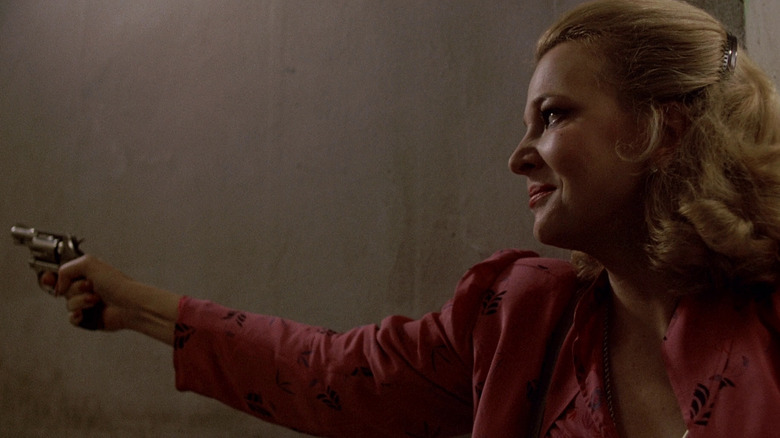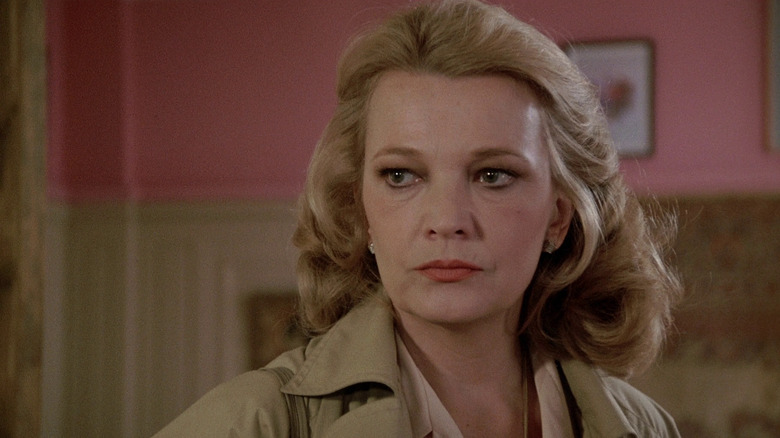Vanessa Kirby's Netflix Thriller Night Always Comes Was Inspired By This '80s Crime Movie
The cost of living crisis, millions of people struggling to pay their bills, rising homelessness: It's a grim situation for many folks out there, and it's been going on for such a long time that pessimists would be forgiven for thinking this is the new normal. Financial woes and desperate situations have always been fertile ground for compelling drama, however, as Benjamin Caron's "Night Always Comes" proved when it dropped on Netflix in August 2025 and instantly became a streaming hit. Starring Vanessa Kirby (she and Caron, a fellow Brit, worked together on "The Crown"), this somber adaptation of Willy Vlautin's novel delves deep into despairing territory while also taking inspiration from a gritty '80s crime movie.
Kirby plays Lynette, a stressed-out Portland woman struggling to keep her head above water as she juggles multiple jobs, attends night school, and cares for Kenny, her older brother with Down's Syndrome (Zack Gottsagen). Living with her slovenly mother Doreen (Jennifer Jason Leigh), Lynette's family is on the verge of losing their rundown house, but they have a slender lifeline if they can purchase the property from the bank. Unfortunately, they are plunged into crisis when Doreen blows the downpayment on a new car, and Lynette is given until the next morning to stump up the cash or face the prospect of getting kicked out of her home and putting Kenny in care.
This is when the movie turns into a nocturnal crime thriller, as Lynette spends the night racing to raise the funds by any means necessary. Lynette has a shady past and gets involved in a series of increasingly perilous quests before facing the movie's final boss in the form of Eli Roth's sleazy rich party fiend Blake, who is eager to score some cocaine for a bargain price. Born out of genuine concern about the cost of living crisis in the United States, "Night Always Comes" is an uneven movie where aspects of neatly observed social realism sit uncomfortably at odds with generic thriller elements. Luckily, Kirby's laser-focused performance keeps things on track until the appealingly downbeat conclusion. Kirby avoids the trap of trying to make Lynette likable, and we still root for her fighting spirit in desperate circumstances – which is where Caron and Kirby took their cue from Gena Rowlands in John Cassavetes' "Gloria."
What happens in Gloria, and how did it inspire Night Always Comes?
At the start of John Cassavetes' "Gloria," mob accountant Jack Dawn (Buck Henry) has made a classic crime thriller mistake. Not only has he turned into an informant for the FBI, but he has also been skimming off the top. That spells doom, as a hit squad wielding shotguns assembles in his apartment building ready to murder him and his entire family. Enter Gloria Swenson (Gena Rowlands), a middle-aged neighbor who comes calling at this critical moment because she has run out of coffee. Jack begs her to hide his six-year-old son Phil (John Adames), along with a ledger full of incriminating evidence against his employers.
Gloria is an unlikely savior, a child-hating former gangster's girlfriend who now lives quietly with her cat a few doors down. She is reluctant to stick her neck out for the boy, but she's not about to let her old underworld pals murder an innocent child, either. Packing a few clothes and a gun, Gloria goes on the lam across New York City with the kid, bouncing from hotel to flophouse as they seek a way out. Inevitably, Gloria's dormant maternal instincts are awoken, and she goes into deadly survival mode, which isn't good news for the goons on their tail. Ultimately, "Gloria" is pretty slim plot-wise, but that hardly matters when you've got a hard-bitten Gena Rowlands on the rampage in a wonderfully scuzzy Big Apple, bullying the bad guys and blazing away with her snub-nosed revolver.
Gloria is a terrific character, and Benjamin Caron explained to The Hollywood Reporter why he screened Cassavetes' neo-noir film at a theater in Portland while preparing to make "Night Always Comes." As he put it:
"I love Gena Rowlands' performance, and in a way, it inspired the soul of 'Night Always Comes.' Lynette is not a victim; she's a catalyst. And like Rowlands' Gloria, she's volatile, emotionally raw, and morally complex. She's more an agent of chaos than a target of it. So, that film was a big influence."
Caron also cited a range of other influences, including "Falling Down," "Uncut Gems," "Taxi Driver," and "Thelma & Louise." But, watching his movie, "Gloria" is clearly the main reference point, with Vanessa Kirby's character reeling from one hazardous situation to another with her vulnerable brother in tow and throwing down on the villains whenever she feels under threat.
Is Gloria worth watching?
John Cassavetes once stated that hated entertainment, which, frankly, is evident from some of his more low-key indie endeavors. He appeared to be having a high old time with "Gloria," though, a movie he originally planned to offload to Columbia Pictures but ended up directing himself with his wife in the lead role. Cassavetes and Gena Rowlands made 10 pictures together in total, with Rowlands earning her first Academy Award nomination for her harrowing performance in "A Woman Under the Influence." That powerhouse turn was Rowlands' crowning achievement, but it was perhaps a little too anguished for Oscar voters, who opted for the more comfortable-to-watch Ellen Burstyn in "Alice Doesn't Live Here Anymore" instead. In time, Rowlands deservedly received another nod for her work on "Gloria," calibrating her trademark intensity towards a more mainstream audience.
Characteristically, for a Cassavetes joint, "Gloria" is immersed in edgy street-level realism but also delivers plenty of crowd-pleasing action beats. Indeed, there's a moment during a subway brawl where Gloria sneers down the barrel of the lens that genuinely gave me the movie chills. Rowlands is equally phenomenal, creating a tough cookie anti-hero to rival Clint Eastwood in "Dirty Harry" and Charles Bronson in "Death Wish."
If the film has a major fault, it's that Cassavetes forgot to cast any other actors who could hold a candle to his wife. Rowlands is the whole show, and she's also saddled with one of the most excruciatingly annoying child actors ever. It was John Adames' only screen role, and the poor kid ended up sharing the very first Razzie for Worst Supporting Actor with Laurence Olivier in "The Jazz Singer," which I guess was at least a conversation-starter for him in later life.
You can spot the influence of "Gloria" in films other than "Night Always Comes." Luc Besson's "Léon: The Professional" rips off the premise, and certain scenes are almost shot-for-shot riffs on those in "Gloria," although a child developing a crush on their savior was far less creepy the way Cassavetes handled it. Eventually, Sharon Stone headlined an awful 1999 remake from Sidney Lumet, which is odd because the original film is the kind of thing Lumet would have knocked out of the park in the 1970s. Eric Zonca's underrated "Julia" fared much better updating the material, though, with Tilda Swinton doing superb work as the wayward titular character. But, for my money, nothing beats Gena Rowlands sticking a gun in your face and calling you a punk.


